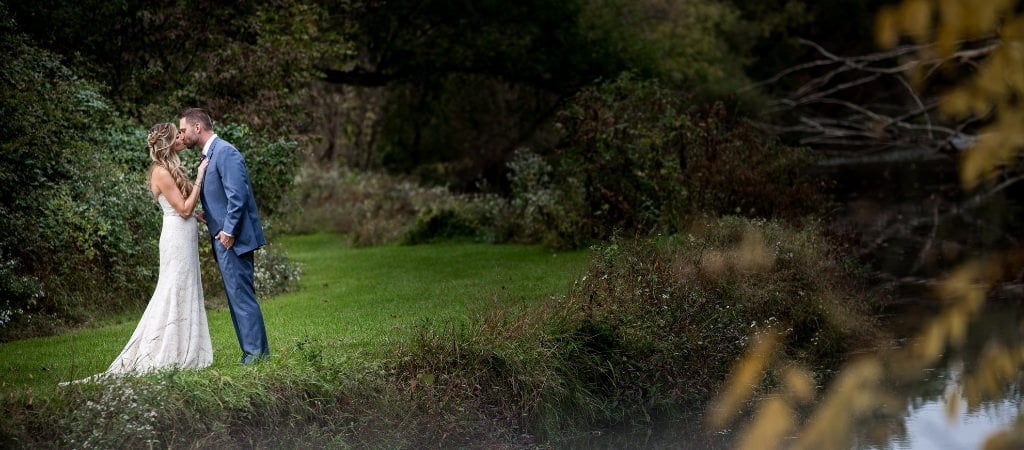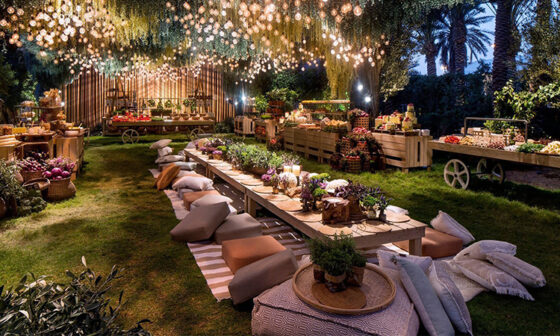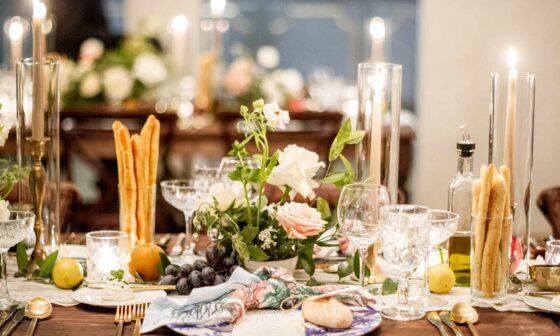Embarking on wedding planning, a journey that’s both exhilarating and a tad nerve-wracking for couples, can be made more manageable with this insightful guide. Designed to alleviate the stress associated with wedding planning, this blog will serve as your compass, offering a roadmap to navigate this exciting endeavor. Leveraging my extensive involvement in orchestrating more than 500 weddings, including my own, I empathize with the overwhelming sensation that accompanies the initial steps. This section delves into the core fundamentals of wedding planning, spotlighting the critical aspects that merit your attention.

Getting Started with Wedding Planning
Infusing an essence of excitement into wedding planning while curbing undue stress is a goal worth pursuing. Drawing from my rich experience of orchestrating over 500 weddings, including my own, I recognize the whirlwind of emotions that accompany the early stages of planning. This section is devoted to elucidating the bedrock of wedding planning, providing insights into where to commence your journey. The pivotal junctures in planning a wedding encompass:
- Determining the key priorities for the couple, pinpointing what truly holds significance.
- Establishing a pragmatic budget that aligns with your aspirations.
- Aggregating your guest list, outlining the attendees who’ll grace your celebration.
- Selecting an idyllic venue that resonates with your vision.
- Fixing a date that harmonizes with your desires and logistics.
- Confirming the bookings with your chosen wedding vendors.
These milestones form the cornerstone of your wedding planning odyssey. Armed with this knowledge, the subsequent steps will unveil the enjoyable facets of the process. Let’s embark on this enriching journey together!
Figure Out What Is Important (And What’s Not Important)

Initiating the wedding planning process necessitates a tête-à-tête with your partner, unraveling what holds paramount importance to each of you—and conversely, what can take a back seat. Each of you should delineate your top 3 (or even 5) indispensable components for your wedding. Arrange these elements and accord precedence to those that carry the most profound significance. After consolidating your individualized lists, convene to evaluate them collectively.
- Do you perceive any commonalities? If so, these shared priorities merit inclusion in your consolidated must-have list.
- Do your lists diverge starkly? Now’s the juncture to engage in that dialogue (an excellent opportunity to hone the art of compromise as a couple).
All elements on your respective must-have lists (and your partner’s) should command the highest attention in the subsequent phase—setting a budget. Devote substantial time to devising these early-stage aspects of wedding planning.
Setting A Wedding Budget (Early On)

Mapping out a pragmatic wedding budget should be atop your agenda when commencing your wedding planning expedition. The absence of a clear financial perspective can fuel stress during the wedding planning process. To forge a comprehensive budget, consider these pointers:
Evaluating Your Current Savings:
Begin by assessing the funds you currently have set aside for your wedding. Jot down this figure, as it forms the cornerstone of your financial plan.
Allocating Future Savings:
Reflect on how much you can earmark from your monthly income toward your wedding fund. The longer your engagement, the greater your potential savings. Sum up the monthly allocation to ascertain the overall future savings.
Identifying External Contributions:
If family members are poised to contribute financially, initiate an open and honest conversation. Gaining clarity on their commitment can steer your budget decisions.
Tabulating Your Resources:
Collate the totals from the three sections above—current savings, projected savings, and family contributions. This amalgamation constitutes your maximum wedding budget.
Defining Your Wedding Investment:
Having established your upper financial limit, jointly delineate the amount you’re willing to invest in your wedding. A substantial budget doesn’t mandate spending it all; your wedding vision can dictate your spending choices.
Creating A Guest List

Once your wedding budget is defined, it’s time to outline a preliminary version of your guest list. This strategic step is crucial as the size of your guest list significantly influences other substantial decisions that involve substantial expenses—venue selection, catering arrangements, bar services, and more. For instance, if you envision hosting over 200 guests, venues with a maximum capacity of 160 would not be suitable and would prove an unproductive pursuit. The creation of your initial guest list is best undertaken at this point.
Choosing A Location For Your Wedding

Determining your guest list is a pivotal task, given its reverberations throughout the planning process. To embark on this task, sit down with your partner and compile a comprehensive list of individuals you intend to invite to the wedding. For ease of organization, maintain separate lists for both sides. Commence with the must-have guests—the individuals whose presence is indispensable (parents, grandparents, siblings, closest friends, etc.). Subsequently, incorporate other individuals you wish to extend an invitation to (extended family, college and high school friends, colleagues, etc.). As you assemble your guest list, it’s prudent to remain attuned to your wedding budget, as the number of invitees directly correlates with the cost. According to a Bankrate article, the average expenditure per wedding guest stands at $256. Making judicious choices regarding the guest list can yield significant savings. For instance, excluding two tables from the reception (equivalent to 16 guests) could potentially save you an average of $4,096.
Choosing A Location For Your Wedding
The next stride on your journey is identifying the ideal locale for your nuptials—a decision closely intertwined with the subsequent phase of picking a wedding date. Prior to commencing your search for the picture-perfect wedding venue, it’s imperative to delineate where your wedding will take place. Consider factors such as your geographical origins and current residence. Suppose both of you hail from different corners of the country or reside in a distinct location from your childhood abodes. In such instances, as I encountered during my own wedding planning, candid conversations become paramount. My wife and I, with roots in Pennsylvania and California respectively, deliberated extensively. While my family was based in California, my wife harbored a long-cherished dream of marrying at her family’s Pennsylvania home. After collective deliberation, we chose Pennsylvania as our wedding location. Once the location is determined, commence your hunt for a suitable venue. Remember, this decision is an extension of your individual priorities. Does one of you envision an outdoor wedding against a picturesque backdrop, while the other leans toward an urban hotel setting? Engage in discourse and compile a roster of potential venues to explore. Valuable tip: Before scheduling venue tours, initiate contact with each venue to request pricing and ascertain their maximum wedding capacity. Armed with your guest list and budget parameters, this proactive step streamlines your venue selection process.
Picking A Wedding Date

In the pursuit of a perfect wedding, the selection of a suitable wedding date bears immense significance. When contemplating your wedding date, several considerations come into play:
The season and weather : Visualize your wedding setting—perhaps outdoors amidst flowering trees or against the backdrop of autumnal hues. If these scenarios resonate with you, consider opting for a spring or fall wedding date.
Availability of important guests: Initiate conversations with your VIPs—those essential guests whose presence you prioritize. Inquire about their travel plans or potential commitments, ensuring your wedding date aligns with their availability.
Budget: If your budget is circumscribed, consider an off-season wedding date (varies by location) to reap substantial cost savings. Additionally, choosing a Friday or Sunday for your wedding can significantly impact your budget.
Your occupation: Your occupation might dictate periods of high workload, influencing your availability. For instance, educators might find summer a more viable option, presenting an opportune time to exchange vows.
Stay tuned for a comprehensive guide on selecting the perfect wedding date, which we will be unveiling shortly.
Researching and Booking Other Important Wedding Vendors

With your wedding date and venue earmarked, the time has come to secure the other pivotal vendors from your list. Revisit the priority list you formulated earlier, and endeavor to book the listed vendors at the earliest. While general guidelines abound, bear in mind that each couple’s priorities are unique. If, for instance, food features prominently on your priority list, promptly arrange meetings and tastings with various caterers to identify the best fit for your vision. Similarly, if capturing wedding memories through photography tops your list, initiate consultations with potential photographers and secure your favorite promptly. A word from experience: As a wedding photographer, the majority of my bookings occur 12-18 months in advance. Waiting until the nine-month mark, as advised in certain sources, may compromise your options, especially during peak seasons. Extend this proactive approach to all vendors significant to your vision—be it a DJ, makeup artist, live band, or florist.
Get Organized With A Printable Or Digital Wedding Planner

Navigating the intricate landscape of wedding planning can be both time-consuming and overwhelming. Fortunately, opting for a wedding planner, be it in printable or digital format, can alleviate stress and expedite the process. A plethora of options exists, and we’ve curated an exceptional printable wedding planner that encompasses every aspect imaginable. This comprehensive resource serves as an ideal repository for all your wedding details. Whether you choose to print the entire planner or only specific sections, it offers flexibility to suit your needs. Explore our wedding planner here. Among our offerings, I highly recommend the $10 ultimate planner, boasting over 400 pages. It encompasses a complete wedding planner, wedding planning checklist, honeymoon planner, rehearsal dinner planner, bridal shower planner, and bachelorette party planner.
Hire A Wedding Planner
While engaging a wedding planner isn’t obligatory, enlisting their services can be immensely beneficial. If you decide to collaborate with a wedding planner, doing so early in the process is optimal. This facilitates their involvement from the outset, enabling them to extend invaluable assistance promptly. Leveraging their close relationships with professional wedding vendors, they can expedite your research and even contribute to cost savings.
Wedding Vision And Style

Leverage platforms like Pinterest to unearth boundless inspiration for your wedding and adeptly organize your ideas. Before embarking on a shopping spree for your special day, it’s essential to define your vision. Engage in discussions with your partner to coalesce ideas. Employ your printable or digital wedding planner to catalog preferences and dislikes, a valuable resource when vendors inquire about your wedding vision and style. Establishing a Pinterest account is a strategic move, facilitating the curation of design concepts across all facets of your wedding day. Our collection of wedding-related boards serves as an abundant wellspring of ideas. For an additional dose of inspiration, Instagram offers a treasure trove. Feel free to follow our account for daily wedding planning tips and captivating photo inspiration.
Assemble an Enthusiastic Wedding Party

Your chosen wedding party plays a pivotal role throughout the planning journey, encompassing showers, bachelorette or bachelor parties, rehearsals, and, of course, the wedding day itself. Carefully curating this ensemble ensures enhanced enjoyment and reduced stress during these pivotal moments. Handpicking your wedding party is a momentous aspect of wedding planning. The key is selecting individuals who will contribute positively and supportively to the process and the big day. A cohesive group of family and friends can add to the celebration’s joy while minimizing potential drama. Having worked with over 500 wedding parties, I’ve witnessed the gamut—from exemplary contributions that encompass finding missing family members, to drama-laden scenarios that mar the day. Beyond merely achieving balance in numbers and coordinating outfits, the essence is forming a collective that you simply cannot imagine getting married without. If the task seems overwhelming, consider a small wedding party or even forgoing one altogether. I’ve had the privilege of photographing weddings with no wedding party—a choice my wife and I embraced, with only one person on each side.
Capture Your Engagement through Photos

Opting for an engagement session with your chosen photographer offers a plethora of benefits. This pre-wedding photoshoot yields a trove of professional images, perfect for embellishing your wedding website and save-the-date cards. In the event that your photographer does not offer engagement sessions, you can embark on a DIY photoshoot using your phone and a tripod.
Crafting an Informative Wedding Website
A wedding website serves as an invaluable platform to communicate essential wedding details with your guests. It’s a hub of information, covering crucial aspects such as dates, times, locations, and more. Beyond the basics, a well-structured wedding website also accommodates:
- Hotel and travel information, including directions
- Transportation details, if provided
- Efficient RSVP management
- Gift registry
- Insights into the couple and the wedding party/bridal party
- Dress code specifications
- Local attractions and activities
- Social media integration for hashtags and media sharing Furthermore, a wedding website offers the advantage of swiftly notifying guests about any last-minute changes, ensuring seamless coordination. Within our community, three prominent wedding website options have garnered substantial recommendations:
- Zola, utilized by 60% of our community (Note: Their Android app was discontinued after January 2023, a consideration for Android users.)
- The Knot, embraced by 30% of our community
- With Joy, favored by approximately 10% of our community These platforms have garnered positive reviews from users within our community who have adopted wedding websites for their celebrations.
Managing Hotel Room Blocks for Out-of-Town Guests

For guests traveling from out of town, securing hotel room blocks can be a thoughtful gesture. It’s advisable to consider reserving 10-20 rooms each at 2-3 hotels, depending on your anticipated out-of-town guest count. Many hotels extend benefits for bringing them a substantial amount of business, such as complimentary upgrades, discounted rates, and even shuttle services. However, exercising caution when entering a contract for room blocks is crucial. Opting for courtesy room blocks, where you’re not financially responsible for unbooked rooms, is generally recommended.

As you secure your venue and hone in on your wedding style and vision, it’s prudent to begin planning your wedding stationery. While various options exist, ranging from professionally designed custom bundles to do-it-yourself solutions using platforms like Canva, the timeline for sending out invitations differs from conventional recommendations. Drawing from my experience working with over 500 couples, I propose alternative timelines:
- Save-the-date cards: 6-10 months before the wedding
- Wedding invitations (if save-the-date was sent): 2-4 months before the wedding (RSVPs requested 6 weeks prior)
- Wedding invitations (if no save-the-date card was sent): 4-6 months before the wedding (RSVPs requested 6 weeks prior) For destination weddings, it’s wise to provide guests with additional time to plan:
- Save-the-date cards (destination wedding): 8-12 months before the wedding date
- Invitations (destination wedding): 4-6 months before the wedding date
Curating Your Wedding Registry

Planning your wedding registry can commence at your convenience. Collaborate with your partner to compile a list of items that align with your needs and preferences. Traditional registry items, ideal for those who lack household items, remain a popular choice. Alternatively, if you wish to forgo conventional gifts, you can consider creating a registry for experiences like a honeymoon fund or a future home fund. It’s recommended to establish your registry ahead of additional parties or showers. If you have a wedding website, incorporating registry information as soon as it’s available is advisable. Additionally, including a registry card insert within your wedding invitations is a courteous approach.
Embracing Additional Wedding Parties
Wedding planning opens the door to an array of supplementary parties for those inclined to celebrate. These may encompass:
- Engagement Parties: Typically held within the first few months of engagement
- Bridal Showers or Couple’s Wedding Showers: Frequently occurring 1-3 months before the wedding
- Bachelorette Parties/Bachelor Parties: Typically taking place 1-3 months before the wedding It’s important to note that these are flexible guidelines, not rigid rules. Personal schedules and preferences play a significant role. My wife and I, for instance, held our bachelorette and bachelor parties a week prior to the wedding, aligning with our logistical circumstances. Ultimately, prioritize what works best for your unique situation.
Marriage License and Legal Requirements
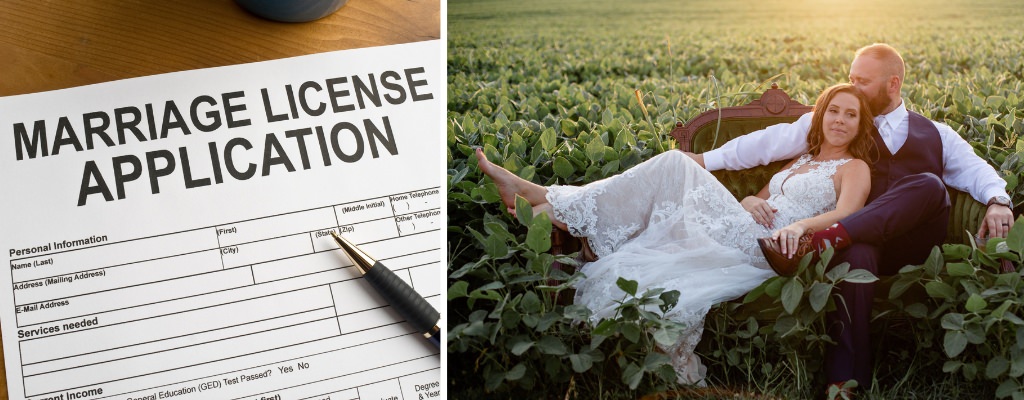
To ensure the legal validity of your marriage, obtaining a marriage license is crucial. Different states and counties have varying regulations, so it’s essential to research the specifics online before visiting your county clerk’s office. The cost and validity period of a marriage license can vary considerably. For instance, some areas may charge $25 for a 90-day validity period, while others might cost $100 for a 30-day validity. To find county-specific information, Google the following phrase: “Where do I go to get a marriage license in (the county you are getting married in).” Ensure you gather any required documentation, as outlined online.
Selecting the Perfect Wedding Dress

Shopping for a wedding dress can be an exciting and memorable experience. It’s advisable to initiate your dress search after confirming the wedding date and securing the venue. This early start provides ample time for exploring various designs and styles without feeling rushed. A recommended timeframe for finalizing your dress purchase is 9-10 months before the wedding date. This allows room for multiple fittings and any necessary alterations, ensuring the dress fits perfectly on your special day.
Attire for Other Wedding Party Members

Here’s a suggested timeline for ordering attire for the wedding party:
- Bridesmaid dresses: Purchase 6-8 months before the wedding day to allow for alterations.
- Groom and groomsmen attire (renting): Get measurements and place orders 2-3 months before the wedding day.
- For suits being purchased or custom-made: Order 5-6 months prior to the wedding date to accommodate alterations and address any issues.
Selecting Wedding Rings

Choosing wedding bands is a joyful shared experience. According to Larson Jewelers, wedding bands are recommended to be purchased 3-4 months before the wedding day. This timeframe provides ample opportunity for any customization, such as engraving or unique designs. For more elaborate customization, consider starting the process even earlier, around 6 months before the wedding.
Planning Your Personalized Wedding Ceremony

Planning the wedding ceremony offers a chance to infuse your personalities and unique love story. Consider the following elements:
- Crafting personal vows
- Selecting readings and readers
- Choosing ceremony music
- Incorporating unity ceremonies
- Determining the ceremony’s length
- Planning decorations
- Deciding on religious or non-religious elements
- Selecting an officiant
- Arranging seating and procession order
- Addressing sound system needs
- Designing the program The wedding ceremony is a canvas to make the event deeply personal and memorable.
Designing a Memorable Cocktail Hour
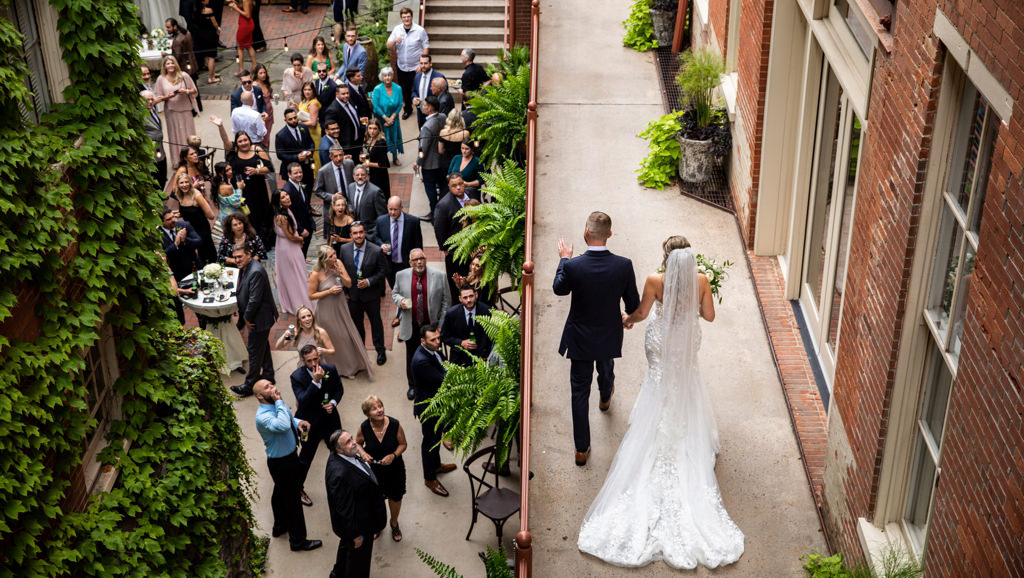
The cocktail hour serves as a time for guests to socialize and relax. Consider these aspects:
- Determine if you and your partner will attend or if it’s reserved for photos.
- Define the duration of the cocktail hour.
- Plan the drink menu, including specialty drinks.
- Organize seating and tables, considering decor and lighting.
- Choose appetizers to complement the drinks.
- Decide on music and sound system needs.
- Consider incorporating outdoor games or activities.
- Determine how guests will transition to the reception area.
Crafting an Unforgettable Wedding Reception

The wedding reception is a chance to celebrate and create lasting memories. Key considerations include:
- Establishing the order of events with a reception timeline.
- Organizing seating with a seating chart.
- Arranging the room layout for tables, DJ, cake, dance floor, etc.
- Identifying individuals giving speeches/toasts.
- Planning decor, centerpieces, and lighting.
- Designing the reception entrance.
- Selecting music for special dances and events.
- Choosing entertainment options.
- Coordinating set up and clean up.
- Addressing transportation needs.
- Planning a memorable send-off.
- Considering wedding favors.
- Determining the menu and bar offerings.
- Designing areas for the gift table, guest book, etc.
- Providing a list of must-play and do-not-play songs for the dance floor. Personalize the reception with unique elements, from music choices to decor and entertainment.
Personal Touches to Make Your Wedding Unique

Infuse your personalities into your wedding to create a memorable experience. Consider these ideas:
- Write custom vows.
- Craft signature drinks with fun names.
- Showcase a slideshow of your love story.
- Have a friend or family member officiate.
- Personalize table numbers or decor.
- Incorporate cultural traditions.
- Use a wedding hashtag for photo sharing.
- Give homemade favors or gifts.
- Feature family photos on the card or gift table.
Managing Wedding Transportation

Deciding on transportation for the couple, wedding party, and guests is an essential aspect. Consider:
- Duration and number of locations requiring transportation.
- Creating a detailed itinerary.
- Calculating the number of vehicles and their types.
- Providing transportation for guests, if desired.
- Arranging buses or shuttles for hotels.
- Communicating transportation details to guests.
Planning the Rehearsal Dinner

The rehearsal and rehearsal dinner are essential pre-wedding events. Focus on:
Rehearsal:
- Schedule and duration.
- Participation of officiant and ceremony helpers.
- Paying attention during the walkthrough.
- Running through processional and recessional.
- Documenting the rehearsal with photos.
- Specifying dress code if the dinner follows the rehearsal.
Rehearsal Dinner:
- Selecting a venue and making reservations.
- Compiling a guest list and sending invitations.
- Considering decor, music, and sound system.
- Incorporating speeches or toasts.
- Distributing gifts if planned.
- Arranging food and drinks.
Expressing Gratitude with Thank You Gestures

Show appreciation to those who contributed to your wedding. While gifts aren’t obligatory, they can be thoughtful:
- Consider small thank you gifts or handwritten notes.
- Express gratitude to the wedding party, family, and friends.
Planning the Honeymoon

Post-wedding, embark on a well-deserved honeymoon. Consider these aspects:
- Decide on immediate or delayed travel.
- Establish a honeymoon budget.
- Explore all-inclusive resort options.
- Take care of passports and other travel documents.
- Consider travel insurance.
- Seek assistance from a travel agent.
- Check destination-specific requirements.
Post-Wedding To-Do List

After the wedding, there are important tasks to complete:
- Send thank you notes for gifts and presence.
- Update legal documents and accounts with new marital status.
- Preserve your wedding dress.
- Return or exchange gifts as needed.
- Post vendor reviews.
- Collect wedding photos from friends and family.
- Ensure vendor payments and tips.
- Address wedding-related items, whether selling, donating, or repurposing.
